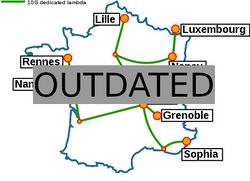Grid5000:Home
|
Grid'5000 is a large-scale and versatile testbed for experiment-driven research in all areas of computer science, with a focus on parallel and distributed computing including Cloud, HPC and Big Data. Key features:
Older documents:
|
Random pick of publications
Five random publications that benefited from Grid'5000 (at least 2932 overall):
- Hugo Thomas, Guillaume Gravier, Pascale Sébillot. Recherche de relation à partir d’un seul exemple fondée sur un modèle N-way K-shot : une histoire de distracteurs. 35èmes Journées d'Études sur la Parole (JEP 2024) 31ème Conférence sur le Traitement Automatique des Langues Naturelles (TALN 2024) 26ème Rencontre des Étudiants Chercheurs en Informatique pour le Traitement Automatique des Langues (RECITAL 2024), Jul 2024, Toulouse, France. pp.157-168. hal-04623015 view on HAL pdf
- Rodrigo Wilkens, Rémi Cardon, Amalia Todirascu, Núria Gala. 3rd Workshop on Tools and Resources for People with REAding DIfficulties (READI 2024). Workshop at the Language Resources and Evaluation Conference (LREC 2024) jointly organized by the ELRA Language Resources Association and the International Committee on Computational Linguistics, 2024, 978-2-493814-34-0. hal-04580167 view on HAL pdf
- Wèdan Emmanuel Gnibga. Modeling and optimization of Edge infrastructures and their electrical systems. Databases cs.DB. Université de Rennes, 2024. English. NNT : 2024URENS069. tel-04967447 view on HAL pdf
- Guillaume Helbecque, Ezhilmathi Krishnasamy, Nouredine Melab, Pascal Bouvry. GPU-Accelerated Tree-Search in Chapel versus CUDA and HIP. 14th IEEE Workshop Parallel / Distributed Combinatorics and Optimization (PDCO 2024), May 2024, San Francisco, United States. 10.1109/IPDPSW63119.2024.00156. hal-04551856 view on HAL pdf
- Célia Mahamdi. Multi-Consensus distribué : agrégation et révocabilité. Réseaux et télécommunications cs.NI. Sorbonne Université, 2024. Français. NNT : 2024SORUS426. tel-04919363 view on HAL pdf
Latest news
Failed to load RSS feed from https://www.grid5000.fr/mediawiki/index.php?title=News&action=feed&feed=atom: Error parsing XML for RSS
Grid'5000 sites
Current funding
As from June 2008, Inria is the main contributor to Grid'5000 funding.
INRIA |
CNRS |
UniversitiesUniversité Grenoble Alpes, Grenoble INP |
Regional councilsAquitaine |


